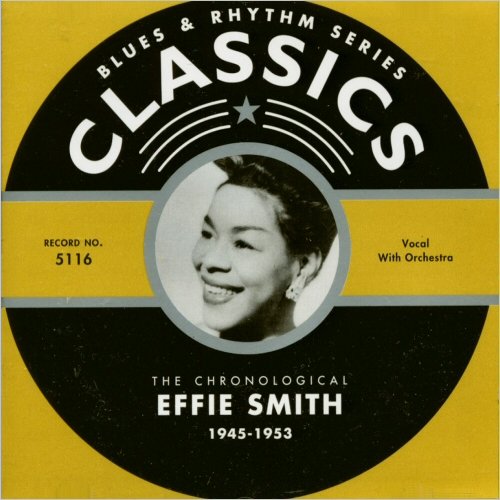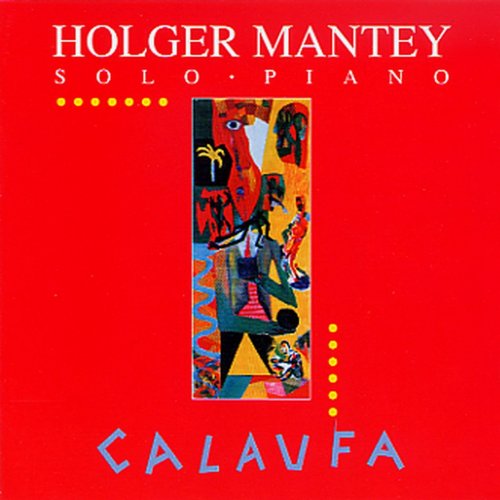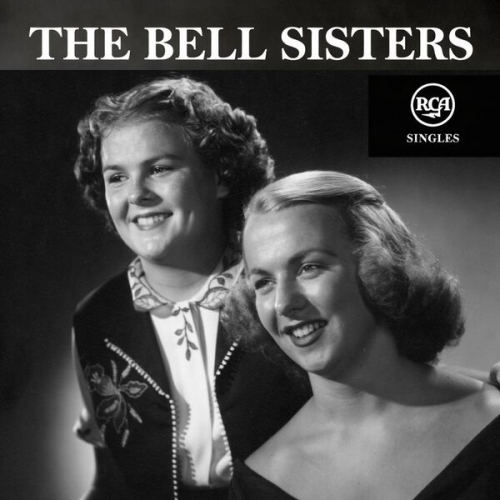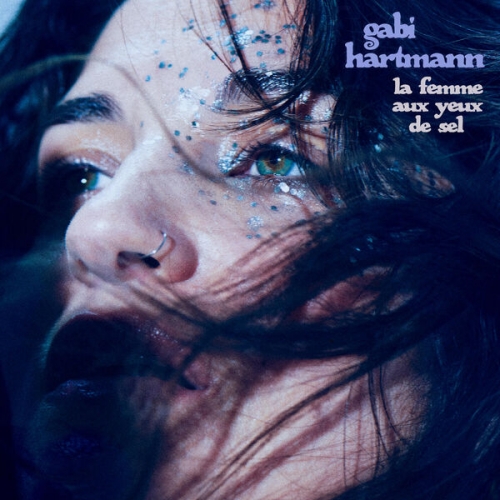Effie Smith - Blues & Rhythm Series Classics 5116: The Chronological Effie Smith 1945-1953 (2004)

Artist: Effie Smith
Title: Blues & Rhythm Series Classics 1945-1953
Year Of Release: 2004
Label: Classics Records
Genre: Blues, R&B
Quality: FLAC (tracks) | MP3 320 kbps
Total Time: 67:27
Total Size: 223 MB | 161 MB
WebSite: Album Preview
Tracklist:Title: Blues & Rhythm Series Classics 1945-1953
Year Of Release: 2004
Label: Classics Records
Genre: Blues, R&B
Quality: FLAC (tracks) | MP3 320 kbps
Total Time: 67:27
Total Size: 223 MB | 161 MB
WebSite: Album Preview
1. Effie's Blues (3:01)
2. I'm In The Groove Tonight (2:18)
3. Ooh, What I Dreamed About You (2:51)
4. Ditty Bag Jump (2:18)
5. I Been Down In Texas (2:46)
6. Root-Lie-Voot (2:52)
7. Gettin' Out (3:00)
8. Wee Baby Brother Blues (3:03)
9. Nothin' You Can Do (3:03)
10. Effie's Boogie (3:01)
11. Haunted By The Blues (3:03)
12. What You Puttin' Down (3:14)
13. Go Ahead With Your Lucky Self (2:31)
14. Sugar-Daddy (2:30)
15. Answer To R. M. Blues (3:01)
16. It's Been So Long (3:03)
17. Ain't Nothin' Nothin' Baby Withou (3:00)
18. Crazy Crazy (2:41)
19. He Treats Your Daughter Mean (2:58)
20. Shoo My Blues Away (2:10)
21. Cry Baby Cry (2:40)
22. Three Men In My Life (2:54)
23. Don't Cha Love Me (2:33)
24. Dial That Telephone (2:45)
Live in a house with someone who never gets off the phone? The ideal gift would be to find a copy of the mid-'60s Jubilee disc Dial That Telephone, in which this ace '50s rhythm & blues and doo-wop veteran chatters and testifies up a storm in the process of lampooning heavy telephone yakkers, complete with funky blues grooves for a backing track. The album was part of a series of novelty releases on Jubilee that were known as "adult listening," although by the standards of 21st century rap, this material by Rusty Warren, Autry Inman, and the like seems more corny than obscene. Smith, who proved she could talk a blue streak around any of the Jubilee artists, was actually best-known as a blues singer from the West Coast scene of the '50s, which is where the satirical telephone recording actually originated. Effie Smith was particularly active from the middle of that decade on, often collaborating with artists such as her husband John Criner and two different doo-wop groups named the Squires. One of these Squires featured Don "Sugarcane" Harris and Dewey Terry, later known as Don and Dewey. And Harris, of course, later went on to instrumental glory with Frank Zappa and others. "Dial That Telephone" was originally recorded in the '50s for the Alladin label as part of the "4000" series -- the next item in the catalog, Ritchie Valens' recording of "Donna" with a little Mexican folk song called "La Bamba" on the other side, obviously made much more of a commercial impact. Smith and hubby Criner also reissued "Dial That Telephone Part 1 and 2" on their own Spot label in 1959. The couple founded a publishing company, Aries Publishing, around the same time, part of a respectable trend of performers getting their mitts on their own recording and pressing ventures. It was at the Spot label that Don and Dewey first stepped forward from the shadows of group membership to become leaders of their own sessions, revealing savvy A&R instincts on the part of both Criner and Smith.
Although nothing quite tops a listener's first reaction to "Dial That Telephone," it is not the only number Smith had up her sleeve. Effie Smith cut many other fine songs, including "Champagne Mind With a Soda Water Income," a tune picked as an "irresistible R&B classic" by one rhythm & blues scholar just on the basis of the song's title alone. Some of her sides with the Squires include "Water, Water" and "You Ought to Be Ashamed," the latter song possibly dedicated to whoever tied up the phone line for so long. In 1965, she cut the hard-to-find single "Teenage World" for Duodisk. An interesting B-side cut for Eee Cee in 1968 takes her telephone yabbering idea and weds it to a then-current country hit, "Harper Valley PTA"; resulting in a number entitled "Harper Valley PTA Gossip," which is almost as much fun as her original phone marathon.
Smith made her first professional splash in the '40s, when she appeared as a regular guest on broadcasts of the Armed Forces Service Radio. Much of this material has been reissued as collector's broadcast transcripts, and reveals a performance opportunity that not only included a hungry, appreciative audience, but a whole world of possible connections and influences for a young performer.
Effie Smith took part in broadcasts with artists such as tenor saxophone colossus Coleman Hawkins, bandleader and composer Benny Carter, and even pianist and eventual classical conductor Andre Previn at the age of 16. Smith cut one her earliest sides, "Answer to R.M. Blues" and "It's Been So Long," for the Miltone label in 1947. ~Eugene Chadbourne
Although nothing quite tops a listener's first reaction to "Dial That Telephone," it is not the only number Smith had up her sleeve. Effie Smith cut many other fine songs, including "Champagne Mind With a Soda Water Income," a tune picked as an "irresistible R&B classic" by one rhythm & blues scholar just on the basis of the song's title alone. Some of her sides with the Squires include "Water, Water" and "You Ought to Be Ashamed," the latter song possibly dedicated to whoever tied up the phone line for so long. In 1965, she cut the hard-to-find single "Teenage World" for Duodisk. An interesting B-side cut for Eee Cee in 1968 takes her telephone yabbering idea and weds it to a then-current country hit, "Harper Valley PTA"; resulting in a number entitled "Harper Valley PTA Gossip," which is almost as much fun as her original phone marathon.
Smith made her first professional splash in the '40s, when she appeared as a regular guest on broadcasts of the Armed Forces Service Radio. Much of this material has been reissued as collector's broadcast transcripts, and reveals a performance opportunity that not only included a hungry, appreciative audience, but a whole world of possible connections and influences for a young performer.
Effie Smith took part in broadcasts with artists such as tenor saxophone colossus Coleman Hawkins, bandleader and composer Benny Carter, and even pianist and eventual classical conductor Andre Previn at the age of 16. Smith cut one her earliest sides, "Answer to R.M. Blues" and "It's Been So Long," for the Miltone label in 1947. ~Eugene Chadbourne




![Alexander Wienand - Strangers (2026) [Hi-Res] Alexander Wienand - Strangers (2026) [Hi-Res]](https://www.dibpic.com/uploads/posts/2026-02/1772172636_cover.jpg)
![Various Artists - Lost Tracks: Accra to Addis (2026) [Hi-Res] Various Artists - Lost Tracks: Accra to Addis (2026) [Hi-Res]](https://img.israbox.com/img/2026-02/26/lqvyrzr9f9yed5j0r3zv7c1r6.jpg)


![Antonio Faraò & Stéphane Belmondo - Do it! (2026) [Hi-Res] Antonio Faraò & Stéphane Belmondo - Do it! (2026) [Hi-Res]](https://www.dibpic.com/uploads/posts/2026-02/1772037177_1.jpg)